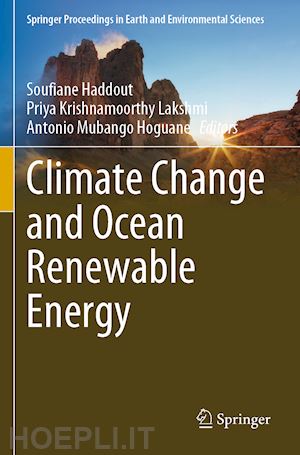
Questo prodotto usufruisce delle SPEDIZIONI GRATIS
selezionando l'opzione Corriere Veloce in fase di ordine.
Pagabile anche con Carta della cultura giovani e del merito, 18App Bonus Cultura e Carta del Docente
Renewable-energy is energy that is collected from renewable resources that are naturally replenished on a human timescale. Renewable-energy includes sources such as sunlight, tides, waves, wind, rain, and geothermal heat. According to BP's-2018 Energy Outlook (EO), renewable energy will be the fastest growing source of energy, increasing fivefold by 2040 thus providing around 14% of global primary energy at this future point. On the other hand, climate change is bringing about rising temperatures, which have significant negative impacts on humans and the environment, and transitioning to renewable energy sources, such as biofuels, can help meet this challenge. Transitioning to renewable energy, and reducing reliance on fossil fuels, is one way to help slow down the effects of climate change. While renewables used to be a more expensive option, new clean energy technologies are lowering costs and helping to move economies away from fossil fuels. The 1st International Conferenceon Climate Change and Ocean Renewable Energy (CCORE 2022), is a virtual conference held from November 4-7, 2022, presenting experiences and ideas through research talks and presentations from diverse fields in climate change and ocean renewable energy. This event offers a platform in bringing together a forum for students, postdocs and established scientists to exchange their ideas and contribute to an integrative approach to climate change and ocean renewable energy.
A. M. Hoguane is a Professor of Physical Oceanography and Director of the Marine Research and Technology Centre-CePTMar at the Eduardo Mondlane University, Quelimane, Mozambique, his research interest are coastal, estuarine and shelf seas hydrodynamics and water quality; waves and coastal currents; river runoff and coastal water productivity; applied oceanography to fish distribution and availability; integrated coastal zone management; alternative energy sources from the sea.
S. Haddout is researcher in fluid mechanics and modeling in the Department of Physics, Faculty of Science, Ibn tofail University, Morocco. His recent research interests concern the Environmental Fluid Mechanics; Hydrodynamic Modeling of Estuaries; Hydraulic modeling; Numerical Modeling; Analytical modeling; Transport modeling; Water managements; Limnology and oceanography; and Optimization methods.











Il sito utilizza cookie ed altri strumenti di tracciamento che raccolgono informazioni dal dispositivo dell’utente. Oltre ai cookie tecnici ed analitici aggregati, strettamente necessari per il funzionamento di questo sito web, previo consenso dell’utente possono essere installati cookie di profilazione e marketing e cookie dei social media. Cliccando su “Accetto tutti i cookie” saranno attivate tutte le categorie di cookie. Per accettare solo deterninate categorie di cookie, cliccare invece su “Impostazioni cookie”. Chiudendo il banner o continuando a navigare saranno installati solo cookie tecnici. Per maggiori dettagli, consultare la Cookie Policy.